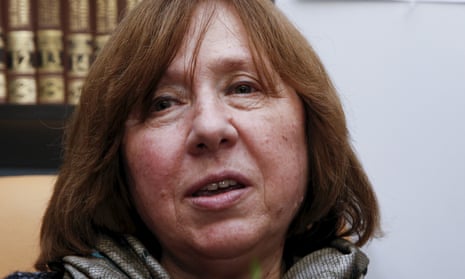Nobel prize winner Svetlana Alexievich has quit the Russian PEN centre to protest against the expulsion of journalist and activist Sergey Parkhomenko, joining 30 other writers including novelist Boris Akunin and poet Lev Rubinstein leaving the organisation.
Alexievich, who withdrew from the organisation on 11 January, wrote in a statement: “My comment on Parkhomenko’s exclusion [from PEN] can only be my application to leave the Russian PEN, whose founding ideals were cravenly violated. In the perestroika years we took pride in our PEN but now we are ashamed of it. Russian writers acted as subserviently and outrageously only during the Stalinist period. But Putin will go, whereas this shameful page from the history of PEN will stay. And the names will stay, too. We now live through times when we cannot win over evil, we are powerless before the ‘red man’. But he cannot stop time. I believe in that.”
This article includes content provided by Facebook. We ask for your permission before anything is loaded, as they may be using cookies and other technologies. To view this content, click 'Allow and continue'.
Thirty writers have now left Russian PEN, with many publishing their withdrawal letters online. Akunin – one of Russia’s most widely read contemporary authors of detective fiction – withdrew the day before Alexievich. Akunin said that he felt Russian PEN did not stand for freedom of speech, that it failed to defend persecuted writers and therefore has “nothing in common” with the global network of PEN centres. There are 145 PEN centres in more than 100 countries, working with the core mission “to defend and promote freedom of expression, and to remove barriers to literature”.
The Russian PEN Centre expelled Parkhomenko for “provocative activity” and “for trying to destroy the organisation from within”. According to their minutes from the 28 December meeting, all 15 members of the board unanimously voted for the journalist’s expulsion.
Parkhomenko said that his expulsion was a punishment for a Facebook post, reported on radio station Echo Moskvy’s website, where he criticised Russian PEN Centre’s chiefs for refusing to support Ukrainian filmmaker Oleg Sentsov, who is serving 20 years in prison after being convicted in a Russian court for “terrorist activity”.
Sentsov was arrested in 2014 and found guilty the following year of planning terrorist acts in Crimea, including setting fire to the offices of a political party in Simferopol, Crimea’s regional capital, and attempting to explode a statue of Lenin. The court ruling was widely criticised as unfounded, with Amnesty International declaring it “redolent of Stalinist-era show trials”. After having spent three years in a Russian prison, he revealed in 2016 in a smuggled letter that he was now in a Siberian penal colony.
Parkhomenko is known as a dissent figure in Russia. He was a key leader in Russia’s protest movement in 2011, which gathered more thant 60,000 people in Moscow and St Petersburg to challenge the presidential election results that gave Vladimir Putin his third term in office. In 2012, he co-founded the League of Voters, which carried lawsuits against the government’s election fraud. In 2014, he participated in the Congress “Ukraine – Russia: A Dialogue”, organised by Ukrainian civil-society organisations and the former head of the Yukos oil company Mikhail Khodorkovsky. The conference aimed to bring Russian and Ukrainian intellectuals, journalists, writers and politicians together to find solutions to the crisis in Ukraine.
In a statement to the Guardian, PEN International executive director Carles Torner said: “We are aware of conflict between the writers at Russian PEN and while all centres are independent they must abide by the principles of the PEN Charter. With this in mind we are monitoring the situation closely and are in touch with all the parties concerned.”
